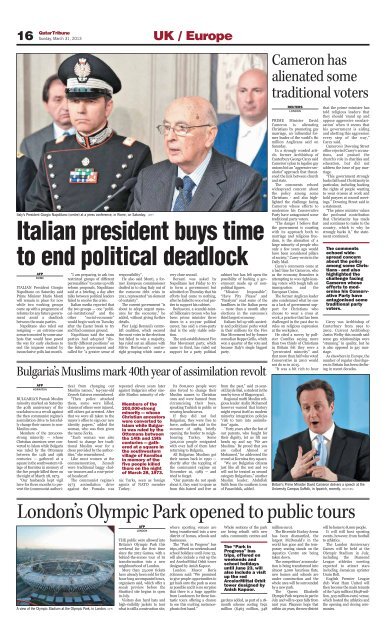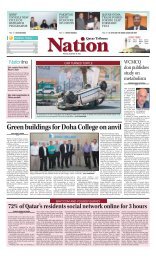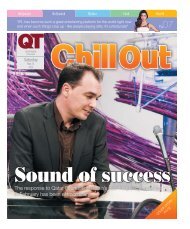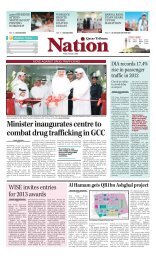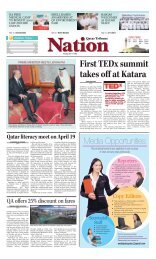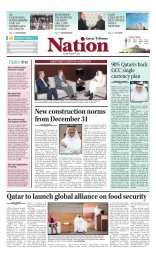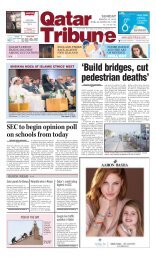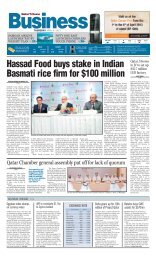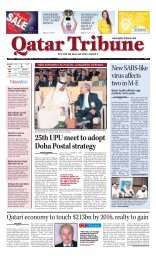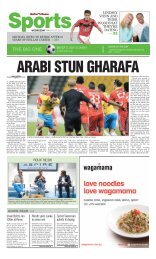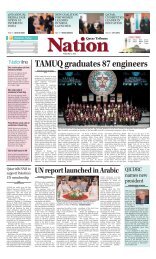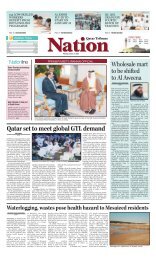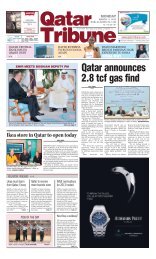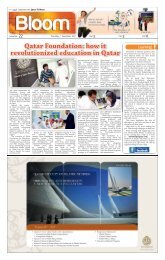Karzai hopeful of Taliban joining mainstream - Qatar Tribune
Karzai hopeful of Taliban joining mainstream - Qatar Tribune
Karzai hopeful of Taliban joining mainstream - Qatar Tribune
You also want an ePaper? Increase the reach of your titles
YUMPU automatically turns print PDFs into web optimized ePapers that Google loves.
16 Sunday, March 31, 2013<br />
UK / Europe<br />
Cameron has<br />
alienated some<br />
traditional voters<br />
Italy’s President Giorgio Napolitano (centre) at a press conference, in Rome, on Saturday. (AFP)<br />
Italian president buys time<br />
to end political deadlock<br />
AFP<br />
ROME<br />
ITALIAN President Giorgio<br />
Napolitano on Saturday said<br />
Prime Minister Mario Monti<br />
will remain in place for now<br />
while two working groups<br />
come up with a programme <strong>of</strong><br />
reforms for any future government<br />
amid a deadlock<br />
between the main parties.<br />
Napolitano also ruled out<br />
resigning — an extreme-case<br />
scenario mooted by some analysts<br />
that would have paved<br />
the way for early elections to<br />
end the impasse created by<br />
inconclusive polls last month.<br />
“I am preparing to ask two<br />
restricted groups <strong>of</strong> different<br />
personalities” to come up with<br />
reform proposals, Napolitano<br />
said at a briefing, a day after<br />
talks between political leaders<br />
failed to resolve the crisis.<br />
Italian media reported that<br />
the two groups — one “political-institutional”<br />
and the<br />
other “social-economic”<br />
would begin work on Tuesday<br />
after the Easter break to try<br />
and find common ground.<br />
Napolitano said the main<br />
parties had adopted “distinctly<br />
different positions” on<br />
the future government and<br />
called for “a greater sense <strong>of</strong><br />
responsibility”.<br />
He also said Monti, a former<br />
European commissioner<br />
drafted in to drag Italy out <strong>of</strong><br />
the eurozone debt crisis in<br />
2011, represented “an element<br />
<strong>of</strong> certainty”.<br />
The current government “is<br />
about to adopt urgent measures<br />
for the economy,” he<br />
added, without giving further<br />
details.<br />
Pier Luigi Bersani’s centreleft<br />
coalition, which secured<br />
the most votes in the elections<br />
but failed to win a majority,<br />
has ruled out an alliance with<br />
Silvio Berlusconi’s centreright<br />
grouping which came a<br />
very close second.<br />
Bersani was asked by<br />
Napolitano last Friday to try<br />
to form a government but<br />
admitted on Thursday that his<br />
efforts had come to nothing,<br />
after he failed to woo rival parties<br />
to support his cabinet.<br />
Berlusconi, a scandal-tainted<br />
billionaire tycoon who has<br />
been prime minister three<br />
times in a 20-year political<br />
career, has said a cross-party<br />
deal is the only viable solution.<br />
The anti-establishment Five<br />
Star Movement party, which<br />
came in third, has ruled out<br />
support for a party political<br />
cabinet but has left open the<br />
possibility <strong>of</strong> backing a government<br />
made up <strong>of</strong> nonpolitical<br />
figures.<br />
“Mission Impossible”,<br />
“Have Pity Please” and<br />
“Paralysis” read some <strong>of</strong> the<br />
headlines in the Italian press<br />
— more than a month after<br />
elections in the eurozone’s<br />
third largest economy.<br />
Italians fed up with austerity<br />
and politicians’ perks voted<br />
in their millions for the Five<br />
Star Movement led by former<br />
comedian Beppe Grillo, which<br />
won a quarter <strong>of</strong> the vote and<br />
became Italy’s single biggest<br />
party.<br />
Bulgaria’s Muslims mark 40th year <strong>of</strong> assimilation revolt<br />
REUTERS<br />
LONDON<br />
PRIME Minister David<br />
Cameron is alienating<br />
Christians by promoting gay<br />
marriage, an influential former<br />
leader <strong>of</strong> the world’s 80<br />
million Anglicans said on<br />
Saturday.<br />
In a strongly worded article,<br />
former Archbishop <strong>of</strong><br />
Canterbury George Carey said<br />
Cameron’s plan to legalise gay<br />
unions hid an “aggressive secularist”<br />
approach that threatened<br />
the link between church<br />
and state.<br />
The comments echoed<br />
widespread concern about<br />
the policy among some<br />
Christians - and also highlighted<br />
the challenge facing<br />
Cameron whose efforts to<br />
modernise his Conservative<br />
Party have antagonised some<br />
traditional party voters.<br />
“The danger I believe that<br />
the government is courting<br />
with its approach both to<br />
marriage and religious freedom,<br />
is the alienation <strong>of</strong> a<br />
large minority <strong>of</strong> people who<br />
only a few years ago would<br />
have been considered pillars<br />
<strong>of</strong> society,” Carey wrote in the<br />
Daily Mail.<br />
Carey’s comments come at<br />
a bad time for Cameron, who<br />
as the economy flounders is<br />
attempting to woo right-leaning<br />
voters with tough talk on<br />
immigration and the<br />
European Union.<br />
The former Anglican leader<br />
also condemned what he saw<br />
as a lack <strong>of</strong> government support<br />
for Christians who<br />
choose to wear a cross at<br />
work, a practice that has been<br />
challenged in the past due to<br />
rules on religious expression<br />
at the workplace.<br />
He cited a survey by pollster<br />
ComRes saying more<br />
than two thirds <strong>of</strong> Christians<br />
in Britain felt they were a<br />
“persecuted minority” and<br />
that more than half who voted<br />
Conservative in 2010 would<br />
not do so in 2015.<br />
“It was a bit rich to hear<br />
that the prime minister has<br />
told religious leaders that<br />
they should ‘stand up and<br />
oppose aggressive secularisation’<br />
when it seems that<br />
his government is aiding<br />
and abetting this aggression<br />
every step <strong>of</strong> the way,”<br />
Carey said.<br />
Cameron’s Downing Street<br />
<strong>of</strong>fice rejected Carey’s accusations,<br />
and praised the<br />
church’s role in charities and<br />
education, but did not<br />
address the issue <strong>of</strong> gay marriage.<br />
“This government strongly<br />
backs faith and Christianity in<br />
particular, including backing<br />
the rights <strong>of</strong> people wanting<br />
to wear crosses at work and<br />
hold prayers at council meetings,”<br />
Downing Street said in<br />
a statement.<br />
“The prime minister values<br />
the pr<strong>of</strong>ound contribution<br />
that Christianity has made<br />
and continues to make to the<br />
country, which is why he<br />
strongly backs it,” the statement<br />
continued.<br />
The comments<br />
echoed widespread<br />
concern<br />
about the policy<br />
among some Christians<br />
- and also<br />
highlighted the<br />
challenge facing<br />
Cameron whose<br />
efforts to modernise<br />
his Conservative<br />
Party have<br />
antagonised some<br />
traditional party<br />
voters.<br />
Carey was Archbishop <strong>of</strong><br />
Canterbury from 1991 to<br />
2002. Current Archbishop<br />
Justin Welby this month said<br />
some gay relationships were<br />
“stunning” in quality, but he<br />
is also opposed to gay marriage.<br />
As elsewhere in Europe, the<br />
number <strong>of</strong> regular churchgoers<br />
in Britain has been declining<br />
in recent decades.<br />
AFP<br />
KORNITSA<br />
BULGARIA’S Pomak Muslim<br />
minority marked on Saturday<br />
the 40th anniversary <strong>of</strong> the<br />
crackdown on a revolt against<br />
the then communist regime’s<br />
assimilation drive to forcefully<br />
change their names to non-<br />
Muslim ones.<br />
Members <strong>of</strong> the 200,000-<br />
strong minority — whose<br />
Christian ancestors were converted<br />
to Islam while Bulgaria<br />
was ruled by the Ottomans<br />
between the 14th and 19th<br />
centuries — gathered at a<br />
square in the southwestern village<br />
<strong>of</strong> Kornitsa in memory <strong>of</strong><br />
the five people killed there on<br />
the night <strong>of</strong> March 28, 1973.<br />
“Our husbands kept vigil<br />
here for three months to prevent<br />
the (communist authorities)<br />
from changing our<br />
Muslim names,” 64-year-old<br />
Zeyneb Gatseva remembered.<br />
“Then police attacked<br />
them, some were killed,<br />
dozens <strong>of</strong> others were injured,<br />
still others got arrested. After<br />
that we were all taken to the<br />
mayor’s <strong>of</strong>fice to sign our new<br />
identity papers,” added the<br />
woman, who was then given<br />
the name Zorka.<br />
“Each woman was also<br />
forced to change her traditional<br />
Muslim wear for a<br />
dress provided by the authorities,”<br />
she remembered.<br />
Like most women at the<br />
commemoration, Zeyneb<br />
wore traditional baggy chalvar<br />
trousers and a rose-printed<br />
headscarf.<br />
The communist regime’s<br />
1973 assimilation drive<br />
against the Pomaks was<br />
Members <strong>of</strong> the<br />
200,000-strong<br />
minority — whose<br />
Christian ancestors<br />
were converted to<br />
Islam while Bulgaria<br />
was ruled by the<br />
Ottomans between<br />
the 14th and 19th<br />
centuries — gathered<br />
at a square in<br />
the southwestern<br />
village <strong>of</strong> Kornitsa<br />
in memory <strong>of</strong> the<br />
five people killed<br />
there on the night<br />
<strong>of</strong> March 28, 1973.<br />
repeated eleven years later<br />
against Bulgaria’s other sizeable<br />
Muslim minority <strong>of</strong> ethnic<br />
Turks, seen as foreign<br />
agents <strong>of</strong> NATO member<br />
Turkey.<br />
Its 800,000 people were<br />
also forced to change their<br />
Muslim names to Christian<br />
ones and were banned from<br />
circumcising their boys,<br />
speaking Turkish in public or<br />
wearing headscarves.<br />
If they did not feel<br />
Bulgarian, they were free to<br />
leave, authorities said in the<br />
summer <strong>of</strong> 1989, briefly<br />
opening the border to neighbouring<br />
Turkey. Some<br />
320,000 people emigrated<br />
with over half <strong>of</strong> them later<br />
returning to Bulgaria.<br />
All Bulgarian Muslims got<br />
their names back in 1990 —<br />
shortly after the toppling <strong>of</strong><br />
the communist regime on<br />
November 10, 1989 — and<br />
tried to forget.<br />
“Our parents do not speak<br />
about it, they want to spare us<br />
from this hatred and free us<br />
from the past,” said 21-yearold<br />
Zayde Bial, a student in the<br />
nearby town <strong>of</strong> Blagoevgrad.<br />
Regional mufti Muslim religious<br />
leader Aydin Mohamed<br />
however warned that history<br />
might repeat itself as modern<br />
minority integration policies<br />
“risk to turn into assimilation”<br />
again.<br />
“Forty years after the feat <strong>of</strong><br />
our parents, who fought for<br />
their dignity, let us lift our<br />
heads up and say ‘We are<br />
Muslims.’ Be proud that you<br />
are called Ahmed or<br />
Mohamed,” he addressed the<br />
crowd at Kornitsa tiny square.<br />
“We are Bulgarian citizens<br />
just like all the rest and we<br />
will not be treated as second<br />
category Bulgarians,” another<br />
Muslim leader, Abdullah<br />
Salih from the southern town<br />
<strong>of</strong> Pazardzhik, added.<br />
Britain’s Prime Minister David Cameron delivers a speech at the<br />
University Campus Suffolk, in Ipswich, recently. (REUTERS)<br />
London’s Olympic Park opened to public tours<br />
A view <strong>of</strong> the Olympic Stadium at the Olympic Park, in London. (AFP)<br />
AFP<br />
LONDON<br />
THE public were allowed into<br />
Britain’s Olympic Park this<br />
weekend for the first time<br />
since the 2012 Games, with a<br />
behind-the-scenes tour <strong>of</strong> its<br />
transformation into a new<br />
neighbourhood <strong>of</strong> London.<br />
More than 23,000 tickets<br />
have already been sold for the<br />
hour-long accompanied tours,<br />
organisers said, which <strong>of</strong>fer a<br />
sneak preview before the<br />
Stratford site begins to open<br />
in July.<br />
Visitors don hard hats and<br />
high-visibility jackets to tour<br />
what is still a construction site,<br />
where sporting venues are<br />
being transformed into a new<br />
district <strong>of</strong> homes, schools and<br />
businesses.<br />
The “Park in Progress” bus<br />
trips, <strong>of</strong>fered on weekends and<br />
school holidays until June 23,<br />
will also include a visit up the<br />
red ArcelorMittal Orbit tower<br />
designed by Anish Kapoor.<br />
London Mayor Boris<br />
Johnson said: “We promised<br />
to give people opportunities to<br />
get back onto the park as soon<br />
as possible and it is no surprise<br />
that there is a huge appetite<br />
from Londoners for these fantastic<br />
tours <strong>of</strong>fering a chance<br />
to see this exciting metamorphosis<br />
first hand.”<br />
Whole sections <strong>of</strong> the park<br />
are being rebuilt with new<br />
cafes, community centres and<br />
The “Park in<br />
Progress” bus<br />
trips, <strong>of</strong>fered on<br />
weekends and<br />
school holidays<br />
until June 23, will<br />
also include a visit<br />
up the red<br />
ArcelorMittal Orbit<br />
tower designed by<br />
Anish Kapoor.<br />
gardens added, as part <strong>of</strong> a 18-<br />
month scheme costing ?292<br />
million ($463 million, 348<br />
million euro).<br />
The Riverside Hockey Arena<br />
has been dismantled, the<br />
largest McDonald’s in the<br />
world has gone and the temporary<br />
seating stands on the<br />
Aquatics Centre are being<br />
taken down.<br />
The competitors’ accomodation<br />
is being transformed into<br />
almost 3,000 luxurious flats,<br />
new homes and schools are<br />
under construction and the<br />
whole area will be surrounded<br />
by a new park.<br />
The Queen Elizabeth<br />
Olympic Park reopens in part in<br />
July and will re-open fully from<br />
next year. Planners hope that<br />
within 20 years, the new district<br />
will be home to 8,000 people.<br />
It will still host sporting<br />
events, however, from football<br />
to athletics.<br />
The London Anniversary<br />
Games will be held at the<br />
Olympic Stadium in July,<br />
including the Diamond<br />
League athletics meeting<br />
expected to attract stars<br />
including Jamaican sprinter<br />
Usain Bolt.<br />
English Premier League<br />
club West Ham United will<br />
then become the main tenants<br />
<strong>of</strong> the ?429 million ($648-million,<br />
503-million-euro) venue,<br />
which hosted the athletics and<br />
the opening and closing ceremonies.


